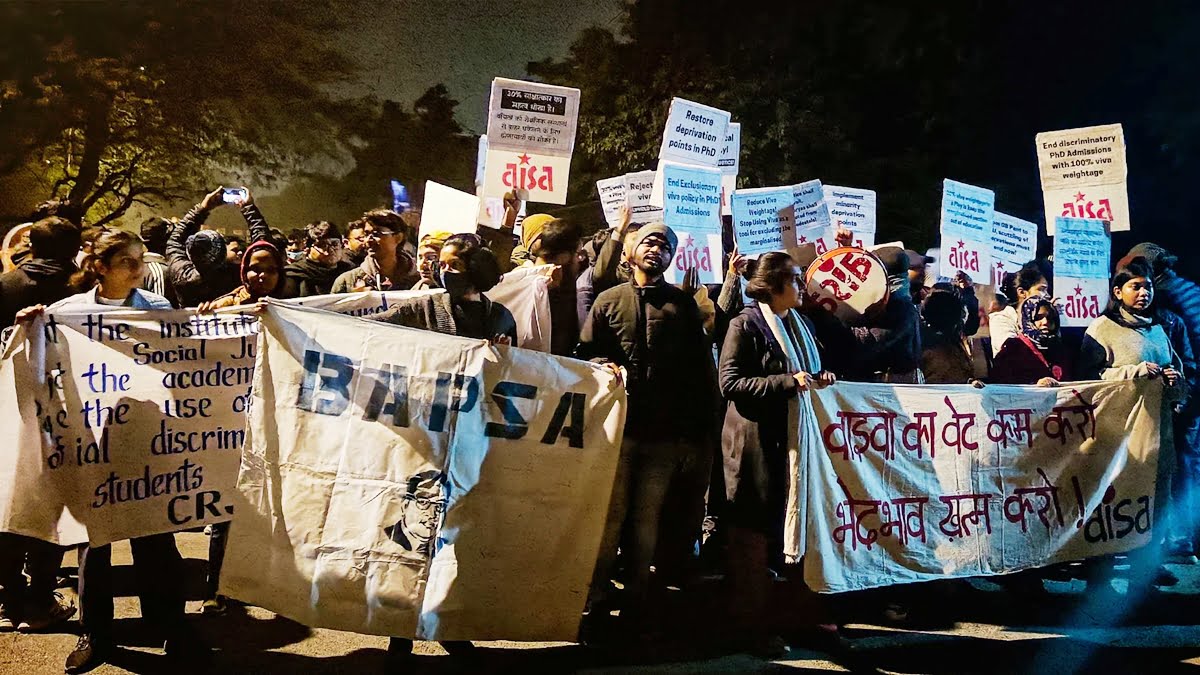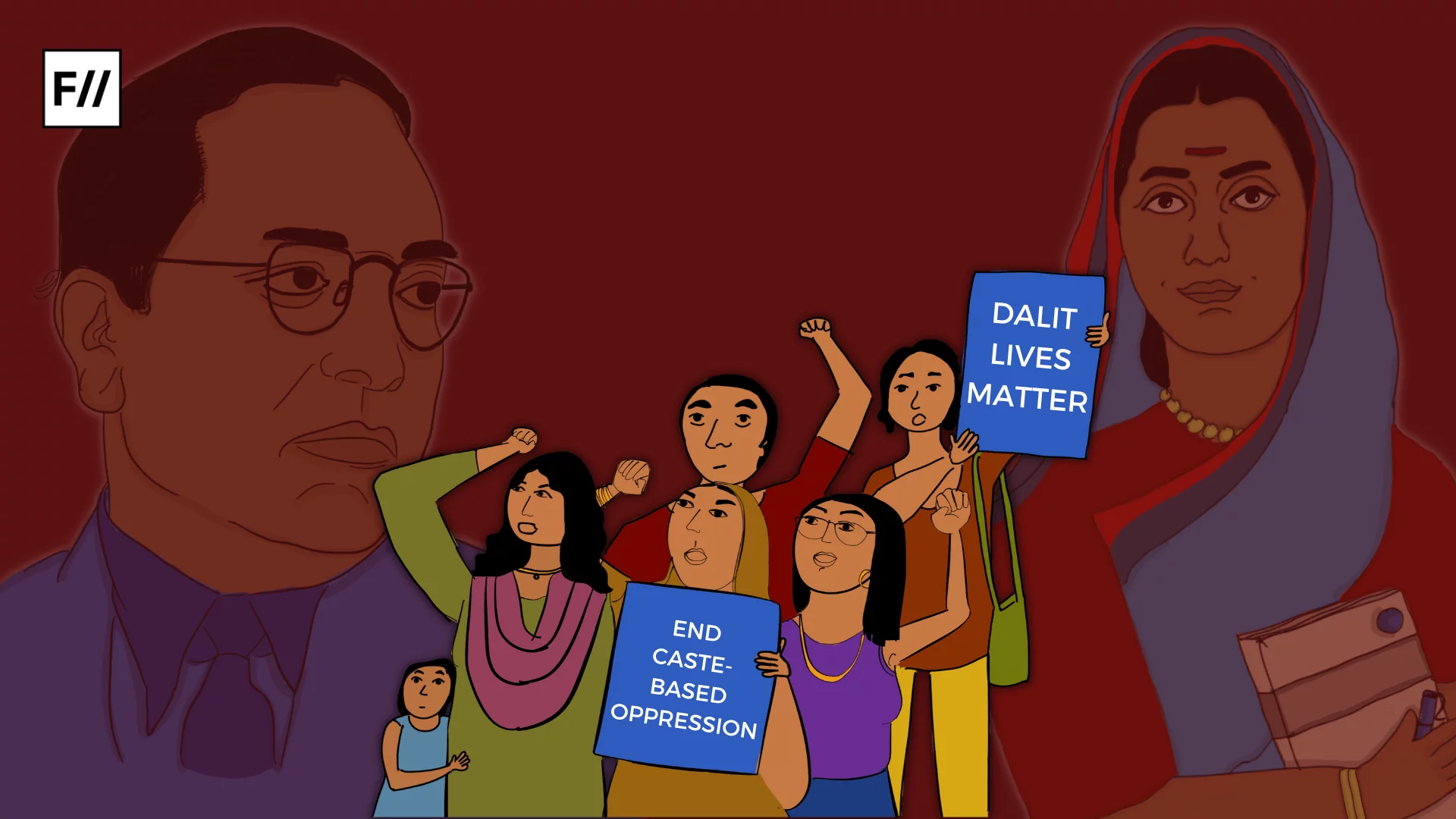The recent protest held at Jawaharlal Nehru University (JNU) led by the Ambedkarite student wing of BAPSA (Birsa Ambedkar Phule Students Association) has resurfaced the issue of institutional discrimination against marginalised identity students prevalent across higher education in India. The Maktoob Media reported: “JNU PhD entrance has both written and viva voce exams. Candidates scoring high marks in written exams have been given exceptionally low marks in viva voce, as low as 1 to 5 out of 30, students claimed. What makes it more controvert is all these students belong to SC, ST, OBC, and Muslim categories.”
Further, BAPSA said it has received testimonials of many JNU PhD admission candidates showing the low and undignified marks they got on the viva voce. “The testimonials collected show how the marks given are not just unjustified, but also humiliating, as well as there is a caste and religion bias for the same,” the group alleged.
However, before commenting on the complacency of the Brahmanical academia we need to understand the underlying function and structure of most entrance examinations held by various higher education institutions in India and how they determine ‘merit’, as observed by Satish Deshpande in his paper ‘Exclusive Inequalities: Merit, Caste and Discrimination in Indian Higher Education Today’.
Also read: Caste-Based Discrimination Rampant In Higher Educational Institutions, Affirms Study
From the point of view of allocation of ‘scarce’ higher education resources, merit discrimination is justified as a method of identifying persons who are best prepared and equipped to enter specialised higher education such as PhDs and those who are deemed worthy of the social investment that educational institutions put at stake by selecting them. Thus, it is these exams and interviews that identify merit. ‘Merit’ provides sufficient justification of discriminating in favour of its bearers and awarding them admission over those who do not have merit.
From the point of view of allocation of ‘scarce’ higher education resources, merit discrimination is justified as a method of identifying persons who are best prepared and equipped to enter specialised higher education such as PhDs and those who are deemed worthy of the social investment that educational institutions put at stake by selecting them. Thus, it is these exams and interviews that identify merit. ‘Merit’ provides sufficient justification of discriminating in favour of its bearers and awarding them admission over those who do not have merit.
These examinations coercively generate rank inequality and persuade both the “selected” and the “rejected” that the division is fair. Thus, the only thing that these exams are expected to produce is a rank ordering that is not disputed by the candidates and is also necessary for the system to succeed. The recent protest at JNU held by the many Bahujan and Muslim “rejected” PhD candidates challenges and brings to our attention the very gatekeeping embodied and reproduced by the higher education system within India.
Further, it is important to note that the merit discrimination system calls for a formal differentiation of a candidate pool through such entrance examinations. The system does not call for or defend the substantive differences that reveal the genuine disparities socially produced among the candidates. Hence, what is generated is only differentiated ranking, with no meaning and emphasis to what these differences imply.
Thus, the Indian higher education institutions who uphold the badge of ‘excellence and merit’, under the pressure of a large number of aspirants, produce the obscure world of third decimal point differences and cut-offs accepted as justified claims of the presence and absence of merit.
While the archaic setup of such a structure largely affects all students seeking education in these institutions, most Bahujan students are the immediate and convenient prey to the anti-reservation discrimination and exclusion inflicted by them. Such regressive systems not only purposefully deny them access to higher education but also diabolically gaslight Bahujan students of being less worthy of acquiring education through these institutions. Thus, the contemporary environment in which most Bahujan students are situated does not make the process of education emancipatory and enlightening for them.
In a similar incident reported a few days ago by The Wire, the GB Pant Social Science Institute of Allahabad found none of the 16 OBC candidates who had been called for interview suitable for the position of assistant professor. The position of associate professor for the OBC category was also left vacant for the same reason – ‘none found suitable’ (NFS). This implies that the panel did not find a single candidate suitable for the position vacant under the reservation quota. The introduction of such a category called ‘NFS’ indicates the mediocrity and latency of the system to address issues of social and political disparity that coincide with the hierarchical nature of our society.
Also read: Reservations For OBCs In Medicine: The Benevolent Casteism In Upper Castes’ Merit Argument
Further, Professor Laxman Yadav of Delhi University in a podcast curated by ‘Anurag Minus Verma’ argues that Universities are endowed with the responsibility to reflect as epitomes of both inclusivity and diversity envisaged within the Indian society. However, upper-caste gatekeepers use tools like viva voce and interviews as counterforces to uphold the political and social hegemony already prevalent within the academia.
Professor Yadav maintains that implicit caste discrimination perpetuated by various institutional stakeholders against such a specific category/community of students is an evidence to the conscious internalisation of casteism effective at the background of decisions and activities undertaken by interview panel, policy makers and other allies within these institutions.
In the same podcast, a known anti-caste figure on social media called ‘Buffalo Intellectual’ familiarises us with the idea of ‘political scarcity’ prevalent in the Indian education system. They argue that such a culture of political scarcity created by the upper caste ruling elite reproduces structures of exclusion that demand the majority of people which fall under the political category of ‘Bahujans’ to constantly bargain and negotiate with the system. Such a culture expects a Bahujan to have fortified social capital if they desire to gain access and participate in such exclusive spaces.
Moreover, the lack of adequate data on the marks awarded to reserved category aspirants as well as the conspicuous silence of the mainstream media, which itself is considered highly casteist, has meant that such issues of gross injustice never garner the attention they deserve and are dismissed as attempts to distort the meritocratic sanctity of Indian education institutions.
Nevertheless, when the APPSC (Ambedkar Periyar Phule Study Circle) of IIT Bombay filed an RTI, it showed that in the past 17 years, only 3% of faculty hired belonged to the SC, ST and OBC communities, whereas 49.5% is the constitutional norm. Study circles such as these have painstakingly gathered information and reported deliberate attempts of awarding abysmally low marks, which in a majority of cases is due to the caste prejudice of ‘upper’ caste interviewers. This coupled with access to several social media platforms where such incidents spread like wildfire have immensely contributed in building a public opinion against such acts of injustice.
Nevertheless, when the APPSC (Ambedkar Periyar Phule Study Circle) of IIT Bombay filed an RTI, it showed that in the past 17 years, only 3% of faculty hired belonged to the SC, ST and OBC communities, whereas 49.5% is the constitutional norm. Study circles such as these have painstakingly gathered information and reported deliberate attempts of awarding abysmally low marks, which in a majority of cases is due to the caste prejudice of ‘upper’ caste interviewers. This coupled with access to several social media platforms where such incidents spread like wildfire have immensely contributed in building a public opinion against such acts of injustice.
Moreover, the historicity of such a phenomenon was brought to light by an internal committee of JNU under the chairmanship of Professor Abdul Nafey. It observed a pattern of difference in the written and the viva voce marks across all social categories – which indicated discrimination – and recommended that the discriminatory pattern would get mitigated if viva voce marks are reduced from 30 to 15. However, no such recommendations proposed by the Abdul Nafey Committee, Rajiv Bhatt Committee and the SK Thorat Committee were implemented within the University. It is also important to note that most institutions exemplify tokenistic attempts to escape from accountability by ensuring that a Bahujan person is appointed as an ‘observer’ in the interview process. Hence, lack of substantial authority and representation in the interview panel contributes to no significant influence in the decision making process.
The educational space is not beyond the political and social space. The manufacturing of knowledge in the modern agraharas of Universities exist in a discursive framework, the hegemony of which is upheld by upper caste Hindus with gloating impunity. This knowledge producing class by its very nature allows for the creation of the ‘other’ – the dependent class, representatives of which are confined to performing the role of an ‘observer’ in interviews, is ‘unmeritorious’ and is coercively expected to arbitrate their way through an upper caste academia. Nevertheless, the dissent against the shrinking of democracy in education and conversations held therein is enabling for many marginalised students and learners in India.
Featured image source: NewsLaundry
About the author(s)
Mansi Bhalerao is an Ambedkarite feminist, an undergraduate at Miranda House. She is an aspiring student of Sociology, trying to navigate and assert her praxis.




